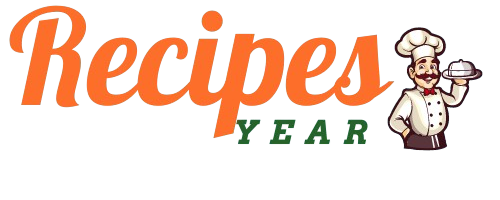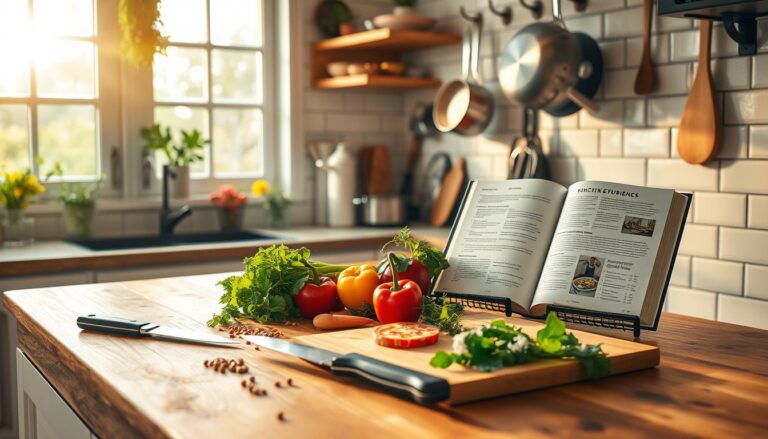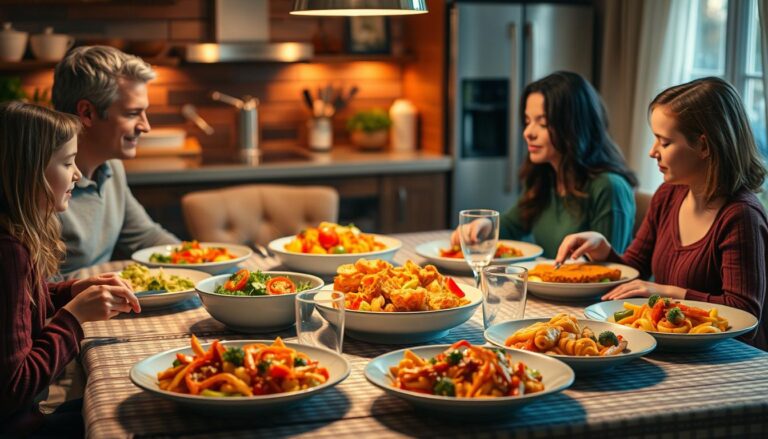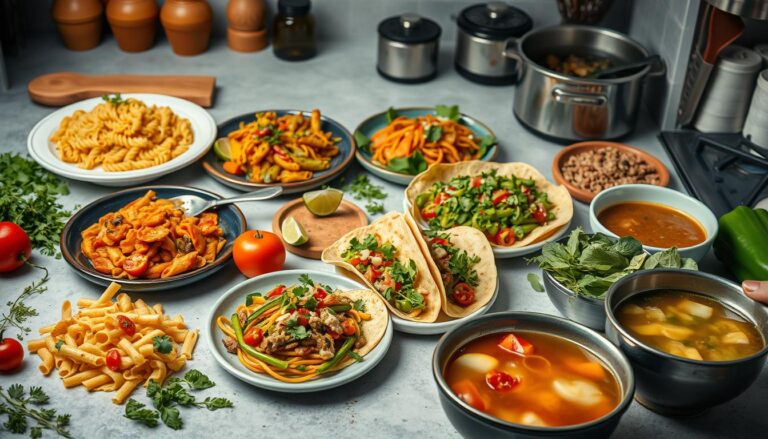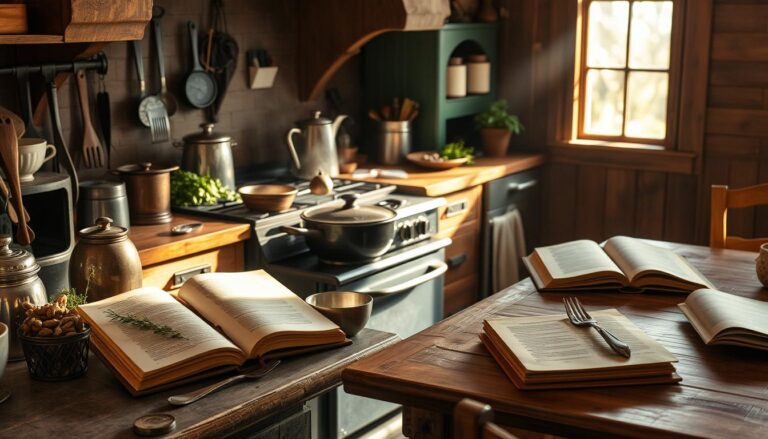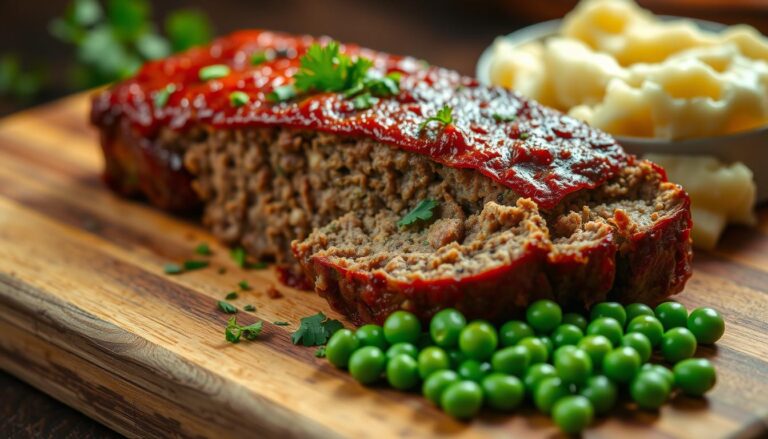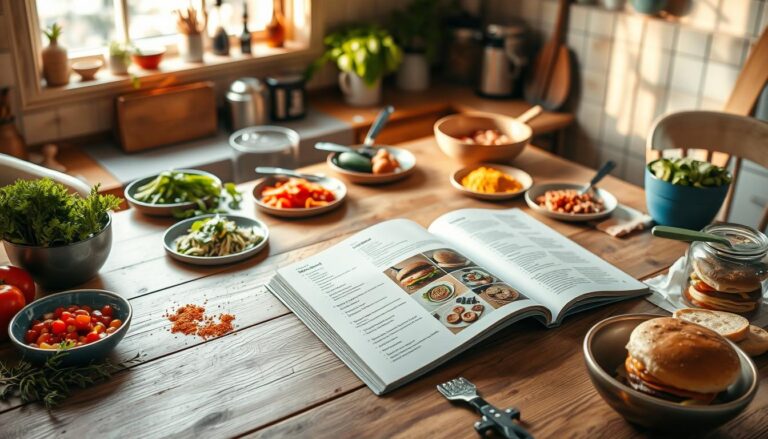Transform Your Cooking Skills: 10 Best Recipes to Challenge and Sharpen Your Abilities
Transform Your Cooking Skills: 10 Best Recipes to Challenge and Sharpen Your Abilities
Welcome to our guide on improving your cooking skills. We’ll cover essential cooking skills, culinary techniques, and kitchen knowledge. These will help you take your food preparation to the next level.
Developing strong cooking skills and mastering various culinary techniques can greatly improve your kitchen knowledge. It also enhances your overall food preparation experience.
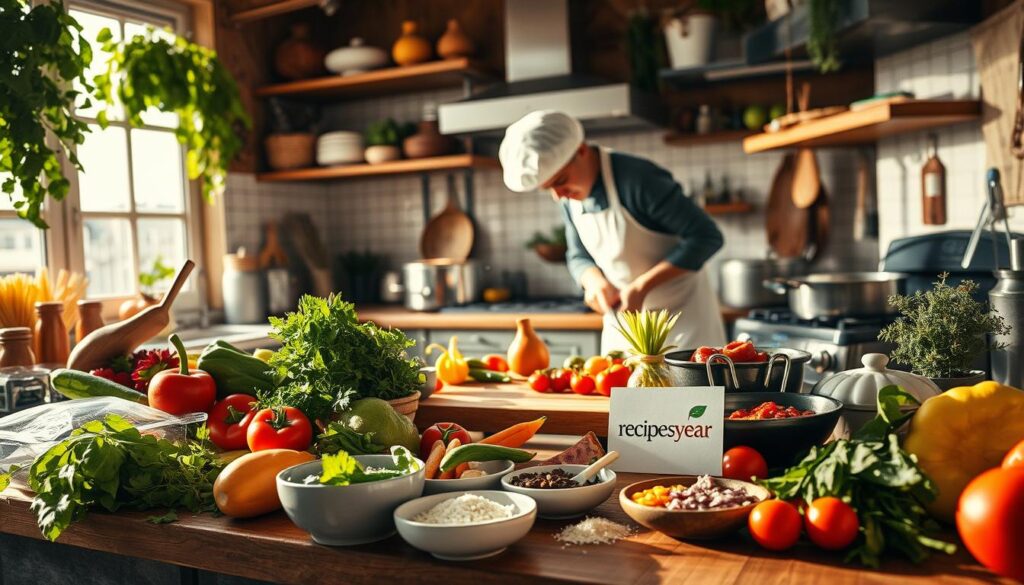
By focusing on cooking skills, culinary techniques, and kitchen knowledge, you can enhance your food preparation. This leads to a more enjoyable and rewarding cooking experience.
Introduction to Culinary Excellence
Our goal is to give you the tools and knowledge to sharpen your cooking skills. We aim to take your culinary techniques to new heights. We’ll cover topics like cooking skills, kitchen knowledge, and food preparation.
Key Takeaways
- Improve your cooking skills with essential culinary techniques
- Develop your kitchen knowledge to enhance food preparation
- Master various cooking skills to take your meals to the next level
- Focus on culinary techniques to improve your overall cooking experience
- Enhance your food preparation with advanced kitchen knowledge
- Sharpen your cooking skills with practice and patience
Mastering Essential Cooking Skills: Your Journey to Culinary Excellence
To become a skilled chef, mastering cooking methods is key. This includes techniques like roasting, grilling, and sautéing. These skills are the base of culinary education and vital for any chef.
Understanding the value of culinary education is crucial. It teaches about ingredients, cooking techniques, and how to present dishes. By learning through culinary education, you can dive deeper into the culinary world and improve your skills.
Some important skills to work on are:
- Knife skills: mastering various cutting techniques
- Cooking techniques: understanding different methods such as roasting and grilling
- Meal planning: learning to plan and prepare meals effectively
By honing these cooking methods and skills, you can enhance your chef skills. Whether you’re new or experienced, culinary education is key to reaching culinary excellence.
The Foundation of Kitchen Mastery
Learning the basics of cooking is key for any chef. Cooking basics like controlling heat, using knives, and timing are essential. We’ll look at why these skills matter and how to get better at them.
To become a master in the kitchen, you need to grasp heat control. It’s about adjusting the heat and using various cooking methods. Also, knowing how to handle knives safely and efficiently is crucial.
Understanding Heat Control
Mastering heat control is vital in cooking. It helps you achieve the perfect dish. You’ll learn about roasting, grilling, and sautéing.
Knife Skills Fundamentals
Knife skills are basic but important. Learning to hold a knife right and cut ingredients well is key. Keeping your knives sharp is also important.
Timing and Coordination
Timing and coordination are key in cooking. They help you cook a meal perfectly. You’ll learn to prioritize tasks and manage time.
By mastering cooking basics, food preparation tips, and kitchen mastery, you can become a great chef. You’ll make dishes that impress and delight everyone.
| Cooking Skill | Importance | Tips and Techniques |
|---|---|---|
| Heat Control | Critical | Understand different cooking techniques, adjust heat, prevent overheating or underheating |
| Knife Skills | Fundamental | Properly hold a knife, cut different types of ingredients, maintain knife sharpness |
| Timing and Coordination | Critical | Prioritize tasks, manage cooking time, ensure all dishes are ready at the same time |
Essential Equipment for Culinary Success
To become a proficient chef, having the right equipment is key. Culinary knowledge and beginner chef skills are important, but the right tools are crucial. Quality equipment helps you master culinary fundamentals and enhances your cooking experience.
A good kitchen needs various pots, pans, knives, and utensils. Here are some must-haves to start:
- Stainless steel pots and pans for durability and ease of cleaning
- A set of sharp knives for precise cutting and chopping
- A cutting board for safe and efficient food preparation
- A set of measuring cups and spoons for accurate ingredient measurement
Having the right tools boosts your kitchen confidence. It lets you focus on improving your culinary knowledge and beginner chef skills. As you cook more, your culinary fundamentals will grow, making complex dishes easier.
Investing in quality equipment is a smart move for your cooking education. With the right tools and practice, you’ll become a skilled chef.
Advanced Techniques Every Home Chef Should Know
To become a skilled cook, you need to learn advanced techniques. These skills will make your dishes stand out. Mastering sauce making, especially French mother sauces, is key.
Learning to make sauces like Béchamel, Velouté, and Hollandaise is important. Also, knowing how to season your food is crucial. It’s about balancing salt, acid, and sweetness for a great taste.
Temperature Control Mastery
Controlling the temperature of your food is vital. It’s important for cooking proteins, vegetables, and grains right. For dishes like roast chicken or beef, getting the temperature just right is essential.
Proper Seasoning Methods
Seasoning is an art that needs a good understanding of flavors. To get better in the kitchen, focus on seasoning. Learn when to add salt, pepper, and other spices to boost your dish’s flavor.
| Sauce | Description |
|---|---|
| Béchamel | A white sauce made with butter, flour, and milk |
| Velouté | A light-colored sauce made with chicken or fish stock and cream |
| Hollandaise | A rich sauce made with egg yolks, butter, and lemon juice |
By learning these advanced techniques, you’ll improve your cooking skills. You’ll be able to make dishes that impress and please everyone.
Challenging Recipe: Perfect French Omelet
To make the perfect French omelet, you need to know a lot about cooking. It’s a dish that requires skill and technique. The quality of eggs is very important for the omelet’s texture and taste.
Cooking a French omelet well means you must control the heat and timing. It should be cooked over low-medium heat. This way, the eggs cook slowly and evenly. It takes patience and attention to get it right.
Here are some tips to help you master the French omelet:
- Use fresh, high-quality eggs
- Cook the eggs over low-medium heat
- Add fillings like cheese or herbs at the right time
- Fold the omelet gently to avoid breaking the eggs
By following these tips and practicing, you can improve your cooking skills. Remember, cooking knowledge is essential for any dish. With patience, practice, and understanding cooking basics, you can become a skilled cook. You’ll be able to make delicious meals for yourself and others.
Mastering the Art of Pasta Making
To become a skilled chef, mastering pasta making is key. This skill helps you cook better and make tasty dishes. With practice, you can get really good at making pasta.
There are a few important things to focus on in pasta making. These include:
- Dough preparation: This means mixing and kneading the dough right. It helps get the dough just right.
- Shaping techniques: Knowing how to shape the dough is important. It lets you make different kinds of pasta.
- Sauce pairing: Finding the right sauce for your pasta is crucial. It brings out the flavors and textures of your dish.
Mastering these areas will make you a great chef. You’ll be able to make many delicious pasta dishes. Remember, learning is important for getting better at cooking. With hard work and practice, you can really improve your cooking skills.
Keep trying new things as you get better at pasta making. This keeps your cooking fresh and exciting. With the right education and skills, you’ll make pasta dishes that wow everyone.
| Pasta Type | Sauce Pairing | Meal Preparation Techniques |
|---|---|---|
| Spaghetti | Tomato sauce | Dough preparation, shaping techniques |
| Fettuccine | Alfredo sauce | Sauce pairing, cooking proficiency |
Elevating Your Baking Expertise
To improve your cooking, you need to get better at baking. This means learning about culinary techniques like choosing the right ingredients and decorating. With these skills, you can make tasty baked goods that wow your loved ones.
Here are some key areas to work on for better baking:
- Learn about baking chemistry, like how leavening agents work and the need for precise temperatures
- Expand your kitchen knowledge by exploring different flours, sugars, and other ingredients
- Practice cooking skills like creaming, kneading, and folding to make a variety of baked goods
By combining these skills, you can make gorgeous and tasty baked goods. This will show off your culinary techniques and kitchen knowledge. Whether you’re new to baking or have experience, there’s always more to learn.
With time and effort, you can master baking and make amazing treats. So, why not start improving your baking skills today and elevate your cooking?
| Ingredient | Importance in Baking |
|---|---|
| Flour | Provides structure and texture |
| Sugar | Adds sweetness and tenderness |
| Yeasts | Helps dough rise and gives flavor |
Advanced Protein Preparation Methods
Learning to cook is key for any beginner chef. Mastering protein preparation is crucial. It can make a dish stand out. You need to know about dry-aging, temperature control, and how to rest and serve.
Improving at protein prep means learning various cooking methods. Dry-aging, for example, needs patience and detail. It makes meat tender and full of flavor.
Dry-Aging Techniques
Dry-aging is complex. It involves aging meat in a controlled space. This breaks down tissues and enhances flavor.
Temperature Control
Temperature is key in cooking meat. It affects texture and taste. Chefs must control it to cook meat perfectly.
Resting and Serving
Resting and serving are the last steps. Letting meat rest redistributes juices. This makes it tender and flavorful. Mastering these steps helps beginner chefs grow.
Perfecting Complex Sauce Creation
To become a skilled cook, you need to master sauce making. A great sauce can turn a simple dish into a masterpiece. It’s key for anyone who loves cooking to get better at making sauces.
When making complex sauces, focus on the ingredients, reduction technique, and flavor balance. Learning these aspects and practicing different methods will help you grow as a cook. For instance, a beurre blanc sauce needs a precise mix of butter, shallots, and wine. You must also know how to reduce it to the perfect consistency.
Here are some tips for mastering complex sauce creation:
- Choose top-notch ingredients, like fresh herbs and real butter, for richer flavors.
- Try out various sauce-making techniques, like reduction and emulsification, to improve your skills.
- Play with different flavor combinations to find the perfect match for your dishes.
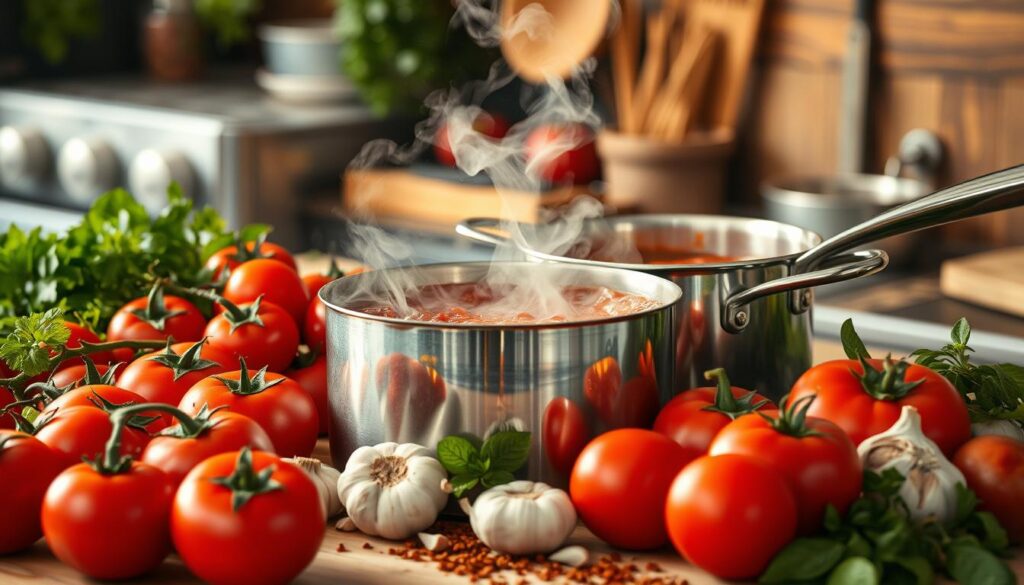
By following these tips and keeping at it, you can become a pro in the kitchen. You’ll be able to make complex sauces that wow everyone.
Exploring International Culinary Techniques
Learning new cooking skills can take you around the world. You’ll discover new tastes and ingredients. Each place, from Asia to the Mediterranean, brings its own cooking style.
Asian Wok Skills
Asian wok skills are key for quick stir-fries. You need to know about heat and how to prepare ingredients. These skills make your dishes tasty and healthy.
Mediterranean Methods
Mediterranean cooking uses fresh herbs and spices. It’s about making healthy, tasty meals. This method lets you cook meals that fit your taste and diet.
Latin American Techniques
Latin American cooking is full of flavor. It uses bold spices and fresh ingredients. Learning these techniques can add new flavors to your cooking.
Exploring international cooking teaches you a lot. You’ll learn about the importance of fresh ingredients. You’ll also master different cooking methods and try new flavors.
- Understanding the importance of ingredient quality and freshness
- Mastering various cooking techniques, such as stir-frying and roasting
- Experimenting with new flavors and spices to create unique dishes
Creating Restaurant-Quality Plating Designs
When it comes to presenting a dish, meal preparation techniques are key to a great look. A well-presented dish can make your meal better, so learning to plate is important. By using cooking proficiency and culinary education, you can make your dish both tasty and beautiful.
To get that restaurant look, try these tips:
- Balance: Make sure the elements on the plate look good together.
- Color: Use garnishes or sauces to add color to your dish.
- Texture: Mix different textures to make your dish more interesting.
Mastering these techniques and using culinary education in your cooking will make your dishes stand out. Remember, meal preparation techniques and cooking proficiency are key to a great dining experience.
With practice and patience, you can impress your loved ones with amazing plating. By combining meal preparation techniques, cooking proficiency, and culinary education, your cooking will reach new heights.
Troubleshooting Common Cooking Challenges
As you get better at cooking, you’ll face challenges in the kitchen. Knowing how to fix these problems is key to becoming a great chef. With your cooking skills and knowledge, you can solve common issues and make tasty dishes.
Temperature Issues
Keeping the right temperature is vital in cooking. If your oven or stovetop is off, it can mess up your dish’s texture and taste. To fix this, get a good thermometer and check your cooking surface’s temperature.
Texture Problems
Texture issues can be a pain, but they’re often fixable. For example, if your veggies are tough, try cooking them longer or using a different method. Knowing how different cooking methods work can help you get the right texture.
Seasoning Adjustments
Seasoning is very important in cooking. Making the right seasoning changes can greatly improve your dish’s flavor. With your cooking knowledge and skills, you can season your dishes perfectly.
Some common seasoning changes include:
- Adding salt or pepper to enhance flavor
- Using herbs and spices to add depth and complexity
- Adjusting the amount of acidity or sweetness in a dish
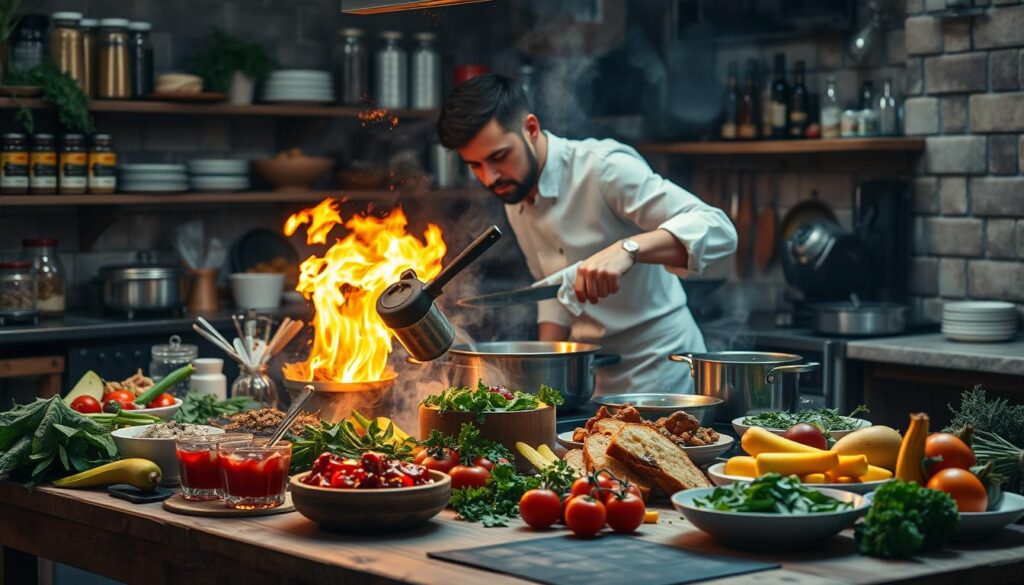
Building a Professional Kitchen Workflow
To improve your cooking, you need a professional kitchen workflow. This means having a strong base in cooking skills and knowledge. A well-organized kitchen helps you cook efficiently, making sure every dish is perfect.
Key parts of a professional kitchen workflow include meal planning, ingredient preparation, and time management. Learning these skills lets you cook complex dishes easily. This makes you more confident and skilled in the kitchen. Here are some tips to help you:
- Invest in quality kitchen tools and equipment to streamline your cooking process
- Develop a system for organizing your kitchen, including storage and cleaning schedules
- Practice time management techniques, such as creating a timeline for each meal preparation
By using these strategies, you’ll boost your cooking skills and knowledge. Remember, a professional kitchen workflow is about being efficient, organized, and detailed.
With a good kitchen workflow, you’ll cook delicious meals easily. So, invest in your cooking knowledge, practice your skills, and learn the basics. Your kitchen workflow will appreciate it!
| Culinary Skill | Importance in Kitchen Workflow |
|---|---|
| Culinary Knowledge | High |
| Beginner Chef Skills | Medium |
| Culinary Fundamentals | High |
Conclusion: Your Journey to Culinary Mastery
As you reach the end of this journey, take a moment to think about how far you’ve come. You’ve learned to control heat and sharpen knives. You’ve even mastered French mother sauces and temperature control. You’re now proficient in the kitchen.
This skill will make your home-cooked meals better. It will also open doors to new culinary adventures.
The journey to becoming a great cook is a long but rewarding one. Keep practicing and stay patient. Try new recipes and ingredients to grow your skills.
By being curious and open to learning, you’ll enjoy the culinary arts more. Your skills will improve, and your relationship with food will change.
This guide has given you the tools and techniques you need to succeed in the kitchen. As you move forward, trust your instincts and be bold. Enjoy every moment of your culinary journey. The possibilities are endless, and your passion will guide you.
FAQ
What are the essential cooking skills every home chef should master?
Home chefs need to learn about heat control and knife skills. They also must master timing and coordination. These skills are key to becoming a great chef.
How can I improve my baking expertise?
To get better at baking, work on your cooking skills and learn new techniques. Knowing about ingredient quality and how to mix and decorate is important. These steps will help you succeed in baking.
What are some advanced cooking techniques every home chef should know?
Home chefs should learn about French mother sauces and seasoning. They also need to get good at controlling temperatures. These advanced skills will make your cooking better.
How can I troubleshoot common cooking challenges?
To fix common cooking problems, use your skills and knowledge. Understanding temperature, texture, and seasoning issues is key. This will help you solve kitchen problems.
What is the importance of building a professional kitchen workflow?
A professional kitchen workflow is crucial for a skilled chef. It involves using your knowledge and skills to work efficiently. This workflow will improve your cooking and make you more productive.
